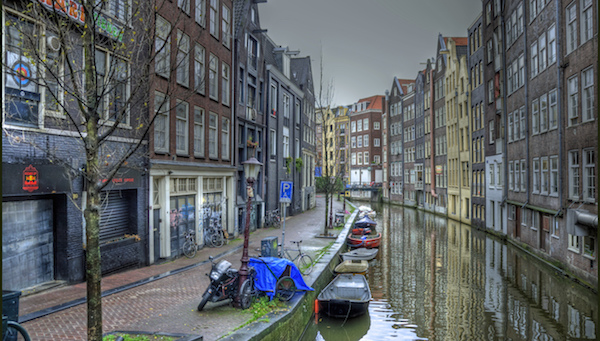It’s a fascinating time to take stock of startup innovation in the Netherlands, a rare turning point where you can watch the hard work of the past give way to the immense promise of the future.
Behind London and Berlin, the Dutch startup scene is already considered to be one of the most prominent in Europe. (If it feels unfair to weigh an entire country against individual cities, consider that the Netherlands has 17 million people crammed into an area half the size of South Carolina.)
Startup Juncture reported 75 major deals in 2014, for a total of roughly $560 million in investment. Ten companies raised over $9 million. In the past few years, especially, each successive quarter has seemingly brought a new standard for sheer volume of activity. The road to this point has been long and deliberate, and Dutch entrepreneurs deserve credit for what they’ve managed to achieve thus far.
And yet, to herald Dutch innovation as it currently stands is to unveil a project that’s still only just underway.
The Dutch, on the whole, speak better English than probably any non-native population in continental Europe, one of the hallmarks of a consistently excellent education system that also scores among the highest worldwide in math and science metrics. Strong economic foundations in industry and commerce offer a dependable framework for continued growth.
And under the proven leadership of Neelie Kroes, the so-called “Internet-Tsar” of Europe, the government’s recent commitments to tech entrepreneurship may mark a bellwether of a new era in startup proliferation.
The early strengths of the Netherlands’ budding startup scene — software, space, smart energy, financial tech, digital health, sharing technology and 3D printing, among others — coincide with the overall direction of global innovation. And the Dutch prowess for high-tech hardware, in particular, has drawn investment interest not just from the United States and Europe, but also from China.
Netflix and Uber both recently decided to establish their European headquarters in Amsterdam. And given the Netherlands’ favorable tax code, strong international travel infrastructure, and newly released startup visa, you can expect other global brands to follow suit.
All of this progress, again, is many years in the making. But it’s hard to look at the Netherlands and not get the sense that 10 or 20 years from now, people will be pointing to this moment and saying the same thing.
Startup Origin Story
Talk to the people at the heart of the Dutch startup scene about how things got to this point, and the first two names you’ll hear are almost always the same. Founded in 1991 and 1996, respectively, Booking.com and TomTom are among the most successful Dutch companies in any field.
Booking.com has gone through two nine-figure acquisitions and facilitated tens of millions of reservations since its launch as a foundational travel site. TomTom, which once made watches and basic GPS devices, now has more than 4,000 employees and high-tech software products in 41 countries. Both are still based out of Amsterdam, but the startup scene around them has changed dramatically in the meantime.
For many years, industry leaders told me, growth was plodding and disjointed. The Netherlands has a strong tradition of entrepreneurship, but the transition toward startup culture was a slow one, and it was years before the corresponding success stories started to emerge.
2006 brought a watershed moment, in that respect: The Next Web held its first conference in Amsterdam. The now-annual event offered budding local leaders a unique window into the global startup world, and offered the world a unique window into the potential waiting to be tapped in the Netherlands.
To this day, no business gathering has done as much to foster international transactions or showcase the Netherlands and its capital.
The global financial crisis of 2008 was a doubly sharp blow, arriving just as the Netherlands’ startup scene was starting to take coherent form. But in the past five years, Dutch entrepreneurs have bounced back in a big way. Where name-brand multinationals like Heineken, Shell and Phillips have struggled to grow, startup entrepreneurship has taken root, giving younger, more agile companies the support system they need to flourish.
In 2011, Rockstart, one of the country’s most prominent incubators, accepted its first class. Startupbootcamp, founded a few months later, has gone on to become one of the most well-recognized names across Europe.
At around this same time, a steady, decade-long shift within the Netherlands’ major universities began to manifest in strong, localized ecosystems that retain more and more of the tech talent that previously went to more traditional industries.
As is usually the case, the government’s involvement lagged behind the rest of the market, but StartupDelta, a publicly backed initiative launched in 2014 and led by Neelie Kroes, has taken on an important coordinating, supporting and promotional role within the broader ecosystem.
Today, startup leaders we spoke to estimate that the Netherlands sees more than 100 deals of under $500,000 a year, and all indications are that these transactions will only continue to flourish. Through the first quarter of 2015, 33 Dutch companies had raised more than $88 million — with the median deal standing at almost $1.15 million — making it the most prolific quarter on record in terms of sheer volume, according to Startup Juncture. (Check out Founded in Holland for a good survey of the scene.)
Dutch companies have seen an encouraging degree of interest from foreign firms. For instance, with more than 25 million active users, WeTransfer, recently brought in $25 million in Series A funding from a European venture firm, at a valuation said to reach as high as $200 million.
More importantly in the long run, there are as many as 15 locally based venture capital firms active in the market, as well, a handful of which are reliable sources of Series B funding or higher.
Amsterdam: The Capital
Only someone who’s never been to Amsterdam could associate it with the Red Light District and legal pot, instead of with the museums, restaurants, architecture, parks and bike-friendly cobble-stoned canalways that make the Dutch capital one of the culturally richest cities in Europe.
It may seem superficial to say so, but one of the biggest advantages Amsterdam has in the tech world is that it’s a place where people want to live — and can actually afford to, even on a startup budget. Local leaders recognize how attractive their city is, and they’re not shy about selling it on those terms.
“We have a huge labor pool coming to Amsterdam, because it’s a beautiful city that’s still affordable,” Bas Beekman, the program director at Startup Amsterdam, told us. “When people are thinking about where to go to work, or where to go to start a business, that’s important.”
Some organizations have gone to additional lengths to incorporate the city itself into their business cultures.
With 67 companies working alongside one another in 6,000 square-meters of ultra-modern office space in the heart of the city, B.Amsterdam stands as one of the physical and spiritual centers of the Amsterdam startup scene. The view from the rooftop park is the envy of the city’s business community, and the facility itself hosts a design academy, gym and post office, and events ranging from art exhibitions to business conferences.
Nestled along one of Amsterdam’s scenic canals, Rockstart is a leading incubator with prime canal real estate. After just two years of activity, its 20 graduates have raised $19 million in funding and created 150 permanent jobs. Founders Oscar Kneppers, Rune Theill and Don Ritzen are widely acknowledged as pioneers of Amsterdam’s startup scene.
Startupbootcamp, an accelerator based in B.Amsterdam, hosts one of the Netherlands’ liveliest demo days and was founded by Patrick De Zeeuw, Alex Farcet, Carsten Kolbeck and Ruud Hendriks in 2010. It also has placed a special emphasis on “smart city and living space” solutions, with titles like smart energy, smart building and smart retail leading its upcoming course list.
ACE Venture Lab has taken a different approach to enmeshing itself within the city. By forming pipelines with leading educational institutions, like the University of Amsterdam, it has drawn a diverse range of young entrepreneurs into its upcoming class.


